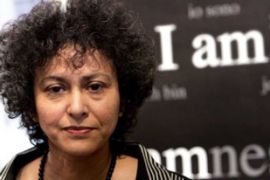Amnesty: World must act on rights
Human rights group says world powers must set example on issue or face global chaos.

| Human rights report | ||
|
This year it criticised Washington for supporting Pervez Musharraf, the Pakistani president, when he imposed a state of emergency, imposed media restrictions and sacked judges.
The report said: “As the world’s most powerful state, the USA sets the standard for government behaviour globally. [The US] has distinguished itself in recent years through its defiance of international law.”
As in the past, the US detention centre in Guantanamo Bay, Cuba, was criticised by Amnesty.
In the report, Khan urged the next US president, due to be elected in November, to announce Guantanamo’s closure on December 10, 2008, the 60th anniversary of the UN declaration.
The US state department made no immediate comment on the report, but it has previously complained that the group uses the US as “a convenient ideological punching bag”.
Activists persecuted
The report also criticised China’s record on human rights, saying the Chinese government continues to persecute human rights activists.
It said Beijing had continued shipping weapons to Sudan in defiance of a UN arms embargo and was trading with countries accused of rights abuses, such as Myanmar and Zimbabwe.
 |
| Amnesty said China continued to persecute human rights activists [AFP] |
It noted that what it called China’s suppressive media censorship remains in place.
Amnesty also accused China of expanding its “re-education through labour” programme, which allows the government to arrest people and sentence them to manual labour without trial.
But the report said that it had detected a shift in China’s position.
It pointed out that in 2007, the country persuaded the Sudanese government to allow UN peacekeepers into Darfur and pressured Myanmar to accept the visit of a UN special envoy.
Khan said: “China is clearly a global power… With that comes global responsibility for human rights. It needs to recognise that economic growth is not enough.”
China has rejected previous such reports and says its human rights record has improved in recent years.
Khan told Al Jazeera that civilians in Africa were also subject to human rights abuses.
“I have been to Darfur three years ago. We met women who have been raped, we met people who have been displaced because their villages were burned down. That situation continues to this day,” she said.
“In Zimbabwe we see violence against political opponents, against dissidents. Since March we have recorded 1,500 cases of people who have needed hospital care for being beaten up.”
Europe warned
With regard to Russia, Amnesty expressed concern about human rights in the country, emphasising a rise in race discrimination.
The group said that the right to freedom of assemblies and associations had come “under a lot of pressure” over the last couple of years.
The report also said the European Union must investigate its member states’ alleged involvement in “extraordinary renditions” of terror suspects.
The EU should set the same bar on human rights for its own members as it does for other countries, the report said.
The organisation said that people across the world are still tortured or ill-treated in at least 81 countries, that men and women face unfair trials in at least 54 countries and that they are denied free speech in at least 77.
